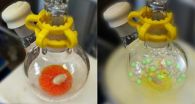(Press-News.org) An international team of scientists has shown that more than 80 per cent of bowel cancers could be treated with existing drugs.
The study found that medicines called 'JAK inhibitors' halted tumour growth in bowel cancers with a genetic mutation that is present in more than 80 per cent of bowel cancers. Multiple JAK inhibitors are currently used, or are in clinical trials, for diseases including rheumatoid arthritis, psoriasis, blood cancers and myeloproliferative disorders.
Bowel cancer is the second-most common cancer in Australia with nearly 17,000 people diagnosed every year, accounting for almost one out of 10 cancer-related deaths.
Dr Toby Phesse, Dr Michael Buchert, Associate Professor Matthias Ernst and colleagues from Melbourne's Walter and Eliza Hall Institute, in collaboration with Australian and international researchers, commenced the study while at the Melbourne-Parkville branch of the Ludwig Institute for Cancer Research. The work has continued at the Walter and Eliza Hall Institute and was published today in the journal Science Signaling.
Dr Phesse said more than 80 per cent of bowel cancers were driven by a defect in the Wnt signaling pathway. "This genetic defect triggers a high level of signaling in the pathway, leading to uncontrolled cell growth and therefore cancer," he said. "Targeting Wnt signaling directly as a treatment for bowel cancer presents several challenges as normal cells in the intestine rely on low levels of Wnt signaling to renew and keep the gut healthy. Blocking Wnt might prevent tumour growth but it could also cause significant damage to the intestines."
However, tumour cell growth can also be stimulated by another signaling pathway, involving proteins known as JAKs (Janus kinases). The research team examined whether targeting this parallel pathway could limit tumour growth without affecting the normal cells of the intestine.
"Our research showed that blocking JAK proteins could inhibit tumour growth in preclinical models of bowel cancer and human bowel cancer cells that have high levels of Wnt signaling," Dr Phesse said. "Importantly, we didn't see any side effects in our preclinical models as Wnt signaling could still function in the normal cells of the intestine, as JAK inhibitors only block cell growth in cells with very high Wnt signaling, such as those found in the tumours. This makes it a very attractive therapy for bowel cancer."
The study found JAK inhibitors were only effective against bowel cancers that were driven by defective Wnt signaling. Tumours that didn't exhibit unusually high levels of Wnt signaling – approximately 10-20 per cent of bowel cancers – did not respond to treatment with JAK inhibitors.
Dr Buchert said the results were significant, as several JAK inhibitors have been approved for clinical use for other diseases. "Clinical trials have already shown that JAK inhibitors are safe for human use," he said. "We hope that this will enable our research to rapidly reach clinical trials for bowel cancer patients and deliver benefits in the near future."
INFORMATION:
The research was funded by Ludwig Cancer Research, the Australian National Health and Medical Research Council, Cancer Council Victoria, The Royal Melbourne Hospital and the Victorian Government. Associate Professor Ernst is a current Ludwig Member.
Eighty percent of bowel cancers halted with existing medicines
2014-10-01
ELSE PRESS RELEASES FROM THIS DATE:
Nanoparticles accumulate quickly in wetland sediment
2014-10-01
DURHAM, N.C. -- A Duke University team has found that nanoparticles called single-walled carbon nanotubes accumulate quickly in the bottom sediments of an experimental wetland setting, an action they say could indirectly damage the aquatic food chain.
The results indicate little risk to humans ingesting the particles through drinking water, say scientists at Duke's Center for the Environmental Implications of Nanotechnology (CEINT). But the researchers warn that, based on their previous research, the tendency for the nanotubes to accumulate in sediment could indirectly ...
Robot researcher combines nature to nurture 'superhuman' navigation
2014-10-01
Computer modelling of the human eye, the brain of a rat and a robot could revolutionise advances in neuroscience and new technology, says a QUT leading robotics researcher.
Dr Michael Milford from QUT's Science and Engineering Faculty says the new study uses new computer algorithms to enable robots to navigate intelligently, unrestricted by high-density buildings or tunnels.
"This is a very Frankenstein type of project," Dr Milford said.
"It's putting two halves of a thing together because we're taking the eyes of a human and linking them up with the brain of a rat.
"A ...
Snapshots of chemical reactions: Characterizing an important reactive intermediate
2014-10-01
An international group of researchers led by Dr. Warren E. Piers (University of Calgary) and Dr. Heikki M. Tuononen (University of Jyväskylä) has been able to isolate and characterize an important chemical intermediate whose existence has, so far, only been inferred from indirect experimental evidence.
Chemical reactions rarely go from starting materials to final products in one single step, but instead they progress through a number of intermediates. In many cases the intermediates are not stable enough to be studied by conventional characterization methods, which thwarts ...
Omega-3 fatty acids may prevent some forms of depression
2014-10-01
Philadelphia, PA, October 1, 2014 – Patients with increased inflammation, including those receiving cytokines for medical treatment, have a greatly increased risk of depression. For example, a 6-month treatment course of interferon-alpha therapy for chronic hepatitis C virus infection causes depression in approximately 30% of patients.
Omega-3 fatty acids, more commonly known as fish oil, have a long list of health benefits, including lowering the risk of heart disease and reducing triglyceride levels. These nutritional compounds are also known to have anti-depressant ...
Power can corrupt even the honest
2014-10-01
When appointing a new leader, selectors base their choice on several factors and typically look for leaders with desirable characteristics such as honesty and trustworthiness. However once leaders are in power, can we trust them to exercise it in a prosocial manner?
New research published in The Leadership Quarterly looked to discover whether power corrupts leaders. Study author John Antonakis and his colleagues from the University of Lausanne explain, "We looked to examine what Lord Acton said over 100 years ago, that 'Power corrupts and absolute power corrupts absolutely.'"
To ...
Non-traditional donor lungs appear safe for transplant
2014-10-01
Chicago, October 1, 2014 – Patients receiving lungs from donors whose cause of death was asphyxiation or drowning have similar outcomes and long-term survival as patients receiving lungs from traditional donors, according to a study in the October2014 issue of the Annals of Thoracic Surgery.
Key points:
Lungs from donors whose cause of death was asphyxiation or drowning can be safely transplanted into patients with end-stage lung disease.
Patient survival rates were not affected when lungs from cases involving asphyxiation and drowning were used.
The researchers note ...
Strict blood sugar control after heart surgery may not be necessary
2014-10-01
Chicago, October 1, 2014 – Patients undergoing coronary artery bypass grafting (CABG) surgery may not have to follow a strict blood sugar management strategy after surgery, according to a study in the October 2014 issue of the Annals of Thoracic Surgery.
Key points
Liberal management of a patient's blood sugar levels following CABG surgery leads to similar survival and long-term quality of life as achieved through stricter blood sugar management.
The findings applied to all patients, regardless of diabetes status.
The results may encourage hospitals to consider ...
Child mortality falls worldwide, but not fast enough, study finds
2014-10-01
Despite advances, millions of children worldwide still die before their fifth birthday, with complications from preterm birth and pneumonia together killing nearly 2 million young children in 2013, according to a study led by the Johns Hopkins Bloomberg School of Public Health.
Their report, published online Oct. 1 in The Lancet, examines what caused an estimated 6.3 million children under the age of five to die in 2013, one-third fewer than the 9.9 million estimated to have died around the world in 2000. While preterm births and pneumonia were also the top killers in ...
Medical discovery first step on path to new painkillers
2014-10-01
A major medical discovery by scientists at The University of Nottingham could lead to the development of an entirely new type of painkiller.
A drug resulting from the research, published in the journal Neurobiology of Disease, would offer new hope to sufferers of chronic pain conditions such as traumatic nerve injury, for which few effective painkillers are currently available.
The work, led by Dr Lucy Donaldson in the University's School of Life Sciences, in collaboration with David Bates, Professor of Oncology in the University's Cancer Biology Unit, focuses on a ...
'Stealth' nanoparticles could improve cancer vaccines
2014-10-01
Cancer vaccines have recently emerged as a promising approach for killing tumor cells before they spread. But so far, most clinical candidates haven't worked that well. Now, scientists have developed a new way to deliver vaccines that successfully stifled tumor growth when tested in laboratory mice. And the key, they report in the journal ACS Nano, is in the vaccine's unique stealthy nanoparticles.
Hiroshi Shiku, Naozumi Harada and colleagues explain that most cancer vaccine candidates are designed to flag down immune cells, called macrophages and dendritic cells, that ...


